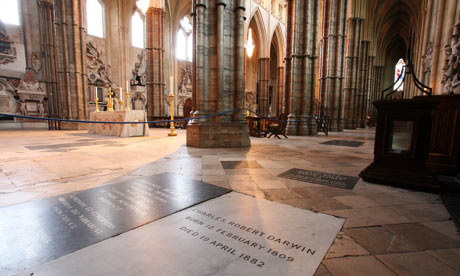
Last night in Westminster Abbey, just yards from the final resting place of Charles Darwin, two believers and two atheists slugged it out before the altar.
On the side of the atheists were Steve Jones, professor of genetics at University College London, and Nancy Rothwell, a professor at the faculty of life sciences, University of Manchester. On the side of the angels were the broadcaster and fertility expert Robert Winston, professor of science and society at Imperial College, London, and Denis Alexander, director of the Faraday Institute for Science and Religion.
They were debating the question "Did Darwin kill God?" at a sell-out event organised by the theology think tank Theos. God himself appeared to intervene early in the debate by muting Professor Jones's microphone and preventing anyone from hearing what he had to say, but a replacement mic was quickly found.
The debate was chaired by Sarah Montague of Radio 4's Today programme, who kicked off proceedings by asking the panellists whether they thought Darwin would have minded being buried in the Abbey. Jones said Darwin would have been "adamantly opposed" to the idea. Winston quipped that rather than Darwin killing God, perhaps God had killed Darwin.
Joking aside, Winston was keen to point out that his own religion, Judaism, had no problem with the theory of evolution because Genesis had always been considered an allegorical account of creation that most Jews did not take literally. When challenged by Montague to reveal the kind of God that he did believe in, however, Winston insisted "I'm not prepared to state what my belief is. It's personal."
Alexander was not so shy, saying he believed "everything that exists exists because of the will of God" and that God resided "outside the space-time continuum". He had no problem with evolution, which he saw as a different kind of narrative that did not conflict with his own belief. However, he believed that God had somehow set the plot or storyline of the universe. He had done this in a non-deterministic way which still allowed humans genuine free will and gave them moral responsibilities.
Jones, meanwhile, revealed that he would "love to believe in God", because it would offer some degree of comfort. But he said he stopped believing in God as a child as soon as he discovered that what he was learning in school biology classes conflicted with the kind of things he had been taught in Sunday school – like dinosaurs and humans walking the earth at the same time.
He insisted that Darwin had indeed "killed God" for many 19th century believers, by destroying the creationist underpinnings of their faith.
Despite their disagreeing about the existence of God, the panellists were united in their condemnation of intelligent design. Alexander said it was "a great way to turn people against religion" and "an aberration from both a religious and a scientific point of view". Rothwell said intelligent design was "pseudoscience" that tried to dress up religious belief as science. Winston agreed, saying it was "bad religion and bad science".
Three of the panellists were also united in condemning Richard Dawkins for his suggestion that it was time to confront believers with a display of "naked contempt". Winston said Dawkins was doing a "grave disservice to science" with such comments, which he said were preventing serious debate and helping to polarise society. He said Dawkins was "a fantastic writer" but The God Delusion was "not well written". Alexander went further, saying that while he would recommend all Dawkins' other books to his own pupils, he wouldn't recommend The God Delusion, which he described as "poorly researched and inaccurate. It makes people ashamed to be atheists." Rothwell agreed that Dawkins "goes out of his way to shock".
It was left to Jones to defend Dawkins' confrontational style, comparing him to another prominent figure in modern biology, James Watson. They were both at times "rude, unpleasant, aggressive," he said. "They don't apologise. But they teach people a lot of biology."
What's the point of debates like this, apart from their obvious entertainment value? This one lacked any real fire, because none of the panellists was a creationist or anti-religious firebrand. All four seemed comfortable with the others' beliefs. They were happy to disagree. The same was true of the audience – a show of hands revealed that the majority thought religious belief could comfortably coexist with Darwin's theory of evolution. Only seven people out of the audience of around 800 considered themselves to be creationists (and were brave enough to raise their hands when Montague asked them).
When she asked whether the arguments put forward in the debate had led anyone in the audience to change the way they thought about either religion or the theory of evolution, only a handful raised their hands.
If Darwin has killed god, the news hasn't yet reached the ears of the faithful.

